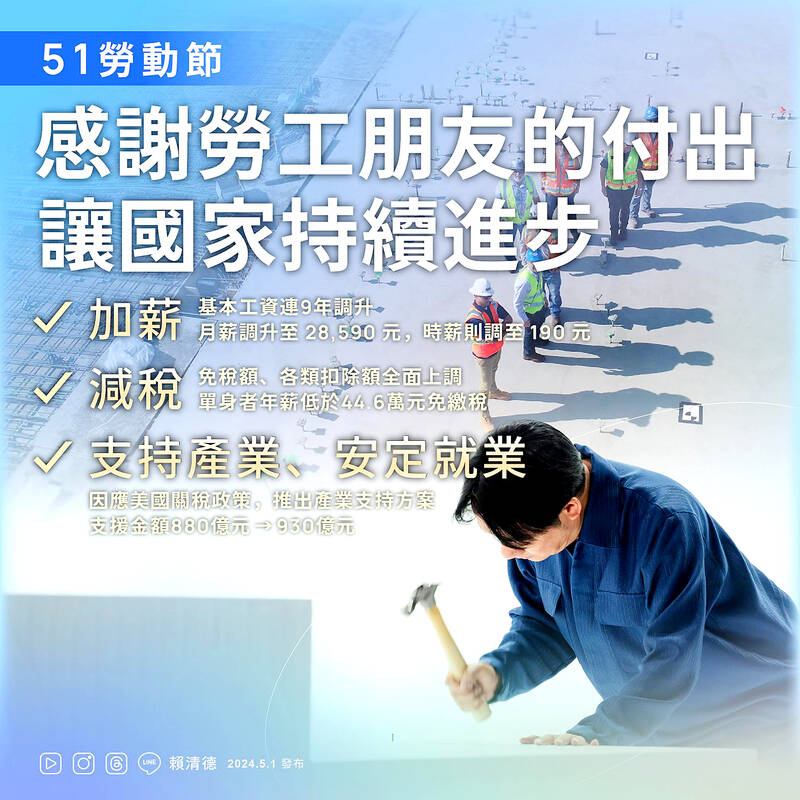The government has boosted the budget for industrial support and employment security to NT$93 billion (US$2.9 billion), and would bolster all industries, President William Lai (賴清德) wrote on Facebook on Workers’ Day yesterday.
Lai thanked workers for invigorating Taiwan by applying their expertise in their professional fields.
The government would continue to reinforce industrial resilience, and introduce more policies to promote labor rights and welfare, he said.

Photo: Screen grab from President William Lai’s Facebook page
The minimum wage has been increased for the past nine years, and labor standards, vocational training and labor-management cooperation would be enhanced to encourage companies to raise salaries, Lai said.
Tax deduction schemes would be adopted to increase disposable household incomes, he said.
“For example, single people with an annual income of less than NT$446,000 are exempt from income tax,” he said.
Lai highlighted a NT$410 billion special budget for industrial development approved by the Cabinet last week in response to ramped-up US tariffs.
The special budget aims to stabilize employment markets, support people’s livelihoods and improve national resilience, he said, adding that a budget to bolster industries and aid employment has been boosted to NT$93 billion from NT$88 billion.
The Ministry of Labor has also implemented multiple pro-worker measures, Lai said.
The ministry helped companies maintain stable employment and supported those affected by the US tariffs to organize vocational training, he said.
The government would help match jobseekers with vocational training to lower the impact on middle-aged and elderly workers, Lai said.
“I believe that the more stable companies are, the more stable workers’ jobs are,” he said, adding that the government would be a staunch backup for all industries.
Separately, the ministry said it has forwarded draft amendments to the Occupational Safety and Health Act (職業安全衛生法) to the Executive Yuan for review.
Premier Cho Jung-tai (卓榮泰) told a Cabinet meeting on “workplace security and zero tolerance of bullying” that the act is the primary law to ensure the health and safety of workers.
The ministry proposed the changes in line with global trends to hold business units accountable for workplace security, with a focus on preventing occupational accidents at source, enhancing contractor management, countering workplace bullying and increasing maximum fines for occupational accidents, he said.
Cho also paid tribute to workers across the country alongside ministry heads on behalf of the government.
Workers are the source of the national productivity that drives economic development and the country would not thrive without their efforts, he said.
As the protection and recognition of the rights of all workers shows how just and civilized a nation is, the government would pursue higher standards and a more comprehensive system to ensure labor rights, Cho said.
The proposed amendments are just the start, he said, calling on the ministry to continue collaborations with agencies and local governments to forge a societal consensus to ensure labor rights, and promote occupational safety and health.
Asked when the draft amendments would be sent to the legislature for review, Minister of Labor Hung Sun-han (洪申翰) said that the Cabinet is processing them and they are expected to be sent to the legislature as soon as possible.
The ministry would collaborate with the Cabinet to accelerate the process, as the draft changes would affect workers and workplace culture, as bullying has become an important issue, he said.

Taiwan is projected to lose a working-age population of about 6.67 million people in two waves of retirement in the coming years, as the nation confronts accelerating demographic decline and a shortage of younger workers to take their place, the Ministry of the Interior said. Taiwan experienced its largest baby boom between 1958 and 1966, when the population grew by 3.78 million, followed by a second surge of 2.89 million between 1976 and 1982, ministry data showed. In 2023, the first of those baby boom generations — those born in the late 1950s and early 1960s — began to enter retirement, triggering

One of two tropical depressions that formed off Taiwan yesterday morning could turn into a moderate typhoon by the weekend, the Central Weather Administration (CWA) said yesterday. Tropical Depression No. 21 formed at 8am about 1,850km off the southeast coast, CWA forecaster Lee Meng-hsuan (李孟軒) said. The weather system is expected to move northwest as it builds momentum, possibly intensifying this weekend into a typhoon, which would be called Mitag, Lee said. The radius of the storm is expected to reach almost 200km, she said. It is forecast to approach the southeast of Taiwan on Monday next week and pass through the Bashi Channel

NO CHANGE: The TRA makes clear that the US does not consider the status of Taiwan to have been determined by WWII-era documents, a former AIT deputy director said The American Institute in Taiwan’s (AIT) comments that World War-II era documents do not determine Taiwan’s political status accurately conveyed the US’ stance, the US Department of State said. An AIT spokesperson on Saturday said that a Chinese official mischaracterized World War II-era documents as stating that Taiwan was ceded to the China. The remarks from the US’ de facto embassy in Taiwan drew criticism from the Ma Ying-jeou Foundation, whose director said the comments put Taiwan in danger. The Chinese-language United Daily News yesterday reported that a US State Department spokesperson confirmed the AIT’s position. They added that the US would continue to

The number of Chinese spouses applying for dependent residency as well as long-term residency in Taiwan has decreased, the Mainland Affairs Council said yesterday, adding that the reduction of Chinese spouses staying or living in Taiwan is only one facet reflecting the general decrease in the number of people willing to get married in Taiwan. The number of Chinese spouses applying for dependent residency last year was 7,123, down by 2,931, or 29.15 percent, from the previous year. The same census showed that the number of Chinese spouses applying for long-term residency and receiving approval last year stood at 2,973, down 1,520,